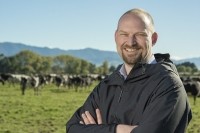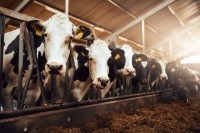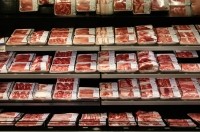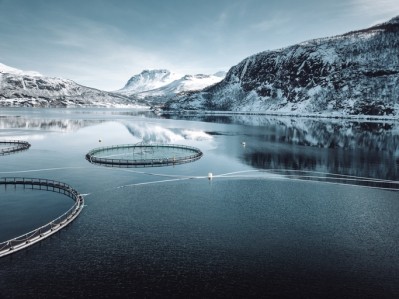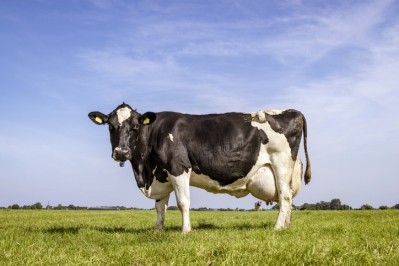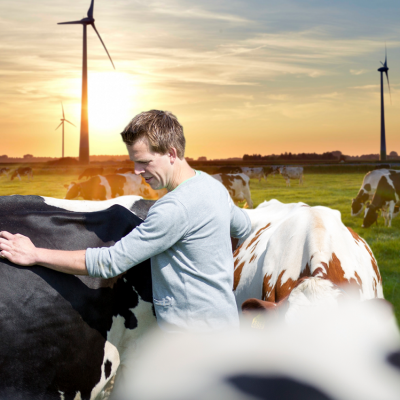Methane busting tool: How DSM has been driving change through collaboration

The Dutch group has formed a strategic alliance with Elanco for Bovaer in the US market, with the aim of supporting the Global Methane Pledge goal of cutting emissions 30% by 2030, which was first announced at COP26 last November.
As part of the agreement, Elanco gains exclusive licensing rights to develop, manufacture, and commercialize Bovaer for beef and dairy cattle in the US.
The additive, according to the parties, is expected to have blockbuster annual revenue potential for Elanco in the US: over US$200m, in an estimated US$1-2 billion global market for methane emissions reduction from cows.
DSM is to receive royalty income from Elanco’s US sales of the additive, including a single-digit millions upfront payment.
The alliance will nearly double the announced global supply potential of Bovaer; with nine million dairy cows and 14 million beef cattle on feed in the US alone, the product would contribute to a significant and immediate reduction of the environmental footprint of meat and dairy products, said the two companies.
Pilot programs – the rationale
DSM has established a number of pilot programs for the feed additive in markets where it has already been approved. Mark van Nieuwland, program director for Bovaer, DSM, spoke to us about the company’s development strategy for the supplement.
He acknowledged the huge shift over the past five years, in terms of global dairy and beef processors looking to make the transition to more sustainable agriculture.
Dairy companies in particular were the first to change, he said, but beef companies have been rapidly catching up: “The speed with which this has taken off has been amazing, with awareness accelerating over the last few years."
Many of the stakeholders DSM has been engaging with come “armed with questions."
In terms of methane emissions, the dairy and beef cooperatives typically want to know that the product works, that there will be no impact on product quality or on their processing systems, and they want to co-design or co-develop the business model supporting the reduction strategy. They also want to know if trial work tailored to their particular system is required, and how they might carry out dissemination activities in order to explain the environmental benefits of the program to the entire value chain, including consumers, said van Nieuwland.
One of the first collaborative agreements that DSM established was with JBS, the largest animal protein company in the world. The deal was signed in November 2021, following market approval for Bovaer in Brazil. “JBS is trying to get to net zero by 2040. Bovaer will be an important element in that, starting at the feedlot, but we are also looking to see if we can introduce the additive even earlier [in the production system]. We expect the first beef products from cows fed Bovaer to be on the market in June.”
European focus
Moving to Europe, and DSM carried out extensive research on the additive with one of its partners there, FrieslandCampina, prior to the pilot project they announced last month. “We looked to see how Bovaer works in a Dutch dairy system, where there are typically three types of rations used. We applied it at two different dosage levels, to see what kind of reductions can be expected and to confirm that it fits in with the local carbon accounting tool, the KringloopWijzer, so that when the product gets to market, the farmers have some way of accounting for the benefit. We worked with local feed companies as part of that research initiative, and FrieslandCampina analyzed milk samples along with processing parameters to ensure there would be no issues when introducing Bovaer into its chain.”
The newly announced pilot program with FrieslandCampina, involving 200 farms and around 20,000 cows, is designed to assess the practicalities of introducing a feed supplement at scale, integrating it into different feeding practices, said van Nieuwland.
In addition, DSM is joining forces with Arla on a pilot, testing the use of Bovaer in a program that involves 10,000 dairy cows across three European countries. “We have worked with Arla previously, testing Bovaer in two different trials in Denmark. In the most recent one, we saw a reduction in methane emissions of around 35%. That involved 200 cows in a controlled farm environment. Now Arla wants to assess the additive at a more meaningful scale, in 50 farms across Denmark, Sweden, and Germany, and to see that its use adheres to local carbon accounting systems.”
DSM is also working on a scheme with Danone in the Benelux markets, to support that company’s carbon neutral Actimel product. Farmers that supply milk for the production of that cultured yoghurt product will be the first in Belgium to start using the feed supplement.
Finnish dairy company, Valio, is engaging with DSM on the technology as well. Meanwhile, February saw the Bel Group announce it was initiating a pilot program, using the additive, aimed at reducing methane emissions in dairy herds in both France and Slovakia.
Down under
Switching to the other side of the world, and DSM revealed, earlier this month, that it was working with Australia’s NAPCo on methane reduction strategies. “It was one of the first companies in the world to have a carbon-neutral beef brand, initially through offsets. Since then it has been looking to actually achieve emission reductions in its own supply chain and that is why it is interested in working with Bovaer."
As well as feedlot application, the partners hope to investigate the use of the additive in terms of an early life stage intervention.
Interestingly, said van Nieuwland, Coles, this month, became the first major Australian retailer to launch a range of certified carbon neutral beef products under its own brand. As part of the carbon neutral beef program, the supermarket group works with farmers to identify ways to reduce emissions from their operations, such as using renewable energy, changing herd management practices for more efficient reproduction and to maximize growth, and use of genetic selection to improve herd health. In tandem with those efforts, it is also purchasing Australian Carbon Credit Units (ACCUs), as an offset mechanism.
“What we now starting to see is that it is no longer just dairy and beef processors taking the initiative, retailers are also beginning to play an active role in this space.”
A hop over to New Zealand, where DSM has been collaborating with Fonterra to understand how Bovaer can work in pasture-based systems. “We are evaluating different ways to make that happen. The program, though, is very much at the early research stage. We are leveraging Fonterra’s knowledge of pasture systems but also the enormous number of cows that the cooperative group has; we are engaging with local research institutes and companies on such applications as well.”
Early findings would indicate the use of slow-release products might be effective in that respect.
Regulatory challenges
In terms of further market approvals, the company anticipates additional registrations in the near future, but it acknowledges that the authorization process can by stymied in many markets, whereby feed additives are historically assessed as either nutritional or veterinary medicine products.
“The question of where environmental benefit sits is one that we have discussed with many governments globally. There are different approaches, some countries look to see whether they can somehow squeeze the additive into the nutritional box, others, like the US, argue that the more formal route, via FDA approval, is necessary, and there are certain countries that say it doesn’t fit in either box, the nutritional or medicinal route. New Zealand has recognized this legislative vacuum and it is looking at how to solve that, to provide a route for products with environmental benefits. We don’t know yet how long this process will take.
“At the end of the day, though, it should be about ensuring the product is safe for the animal, the person using it, and the environment, and that it also delivers on any claims made for it.”
Incentivizing carbon farming
Incentivizing carbon farming can be done through different models and payment structures, said van Nieuwland.

Some dairy and beef processors may continue to absorb the costs. Arla, for example, is weighing up how it can compensate farmers for some of the sustainability efforts they are undertaking. In other markets, farmers themselves may look to combine environmental benefits with a guaranteed long-term income stream via carbon credits, while public funding may also be the dominant model in the years to come, he noted.
Belgium has been a pioneer country in respect of incentivizing farmers to use methane reduction technologies, commented van Nieuwland. “The Flemish government has created a fund whereby farmers can apply, for example, to have one third of the cost of using Bovaer in their feed covered.”
Research database
DSM has published every study it has undertaken on Bovaer application in beef and dairy systems, he said.
A number of universities have been participating in meta-analysis research, trying to come up with a predictive algorithm to determine under what conditions the feed supplement reduces methane and by how much.
There are three elements that play a role in such forecasting, he said, including the digestible fiber content, the fat content, and the inclusion rate of Bovaer in the dairy and beef rations.
“Incorporating those three components and the meta-analysis, we can now predict, pretty accurately, how much methane reduction will result, and this dataset can be used by many countries for national accounting purposes,” reported van Nieuwland, adding that this is key in order for farmers to get recognized for the efforts they make.
The data will be published in a peer reviewed journal in the next month.
